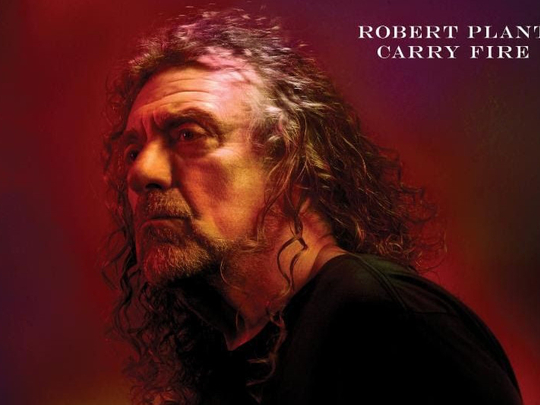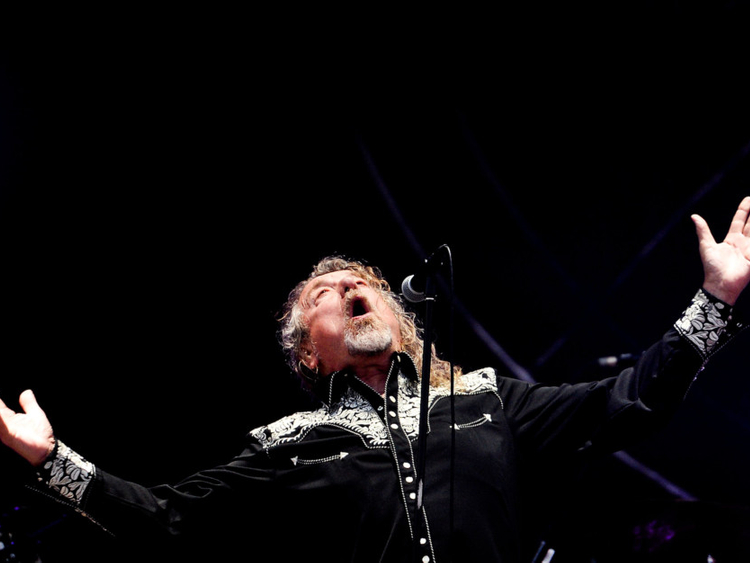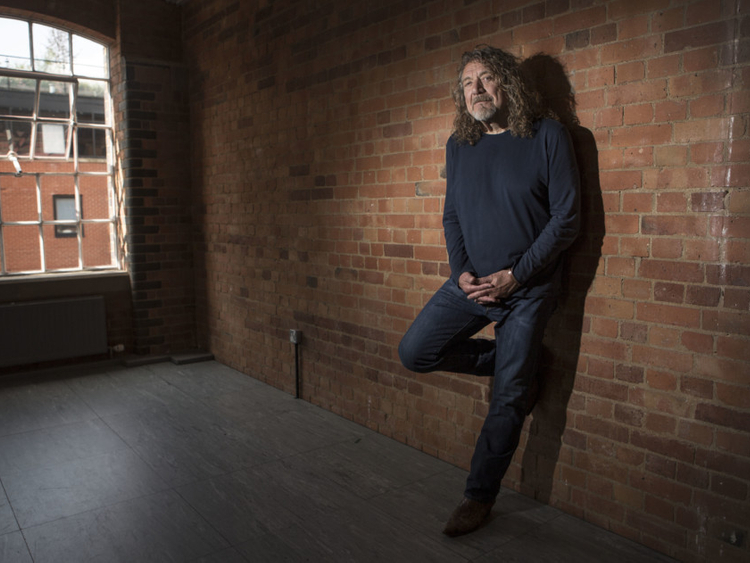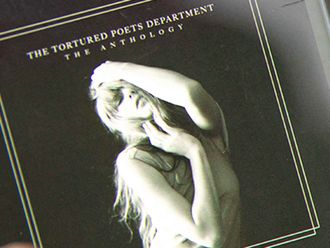
Grey bearded, long haired, wrinkly and twinkly, at 69 Robert Plant still comports himself with a vivacious energy. On a street on Primrose Hill, his London stomping ground, he greets passers-by with friendly cheer, hailing a bald, stooped man many years his senior with a hearty “How are ya, kid?” He stops in Sam’s Cafe, a retro diner, where (a waitress proudly tells me) Plant chose all the records on their vintage Rockola jukebox. Plant studies the playlist: Roy Orbison, Etta James, Ray Charles, and it seems to briefly give him pause.
“How many voices are disappearing? The contributions to our time of listening and wonder,” he says with a typically poetic turn of phrase. “There’s always a trip going to say goodbye.” Then he laughs. “Maybe that’s how people think about me! Better go and see Planty! How much longer can he keep it up?’”
Plant dropped a new album that came out on Friday, Carry Fire — a wonderful record from perhaps our most adventurous rocker. It’s with the same multi-instrumental line-up he has been working with, on and off, since 2005’s Mighty ReArranger. The Sensational Space Shifters craft a dazzling weave of psychedelic polyrhythmic grooves, meshing country, blues, folk and rock’n’roll with North African scales and beats, to which Plant contributes lyrics and melodies.
He describes the album as “a declaration of how best I am to myself, which is in flux. I mean, I love flux.” It’s also his “15th collection of songs since Bonzo passed away” as he puts it. The death of his oldest friend, drummer John Bonham, in 1980, brought an end to Led Zeppelin, perhaps Earth’s greatest rock group. Since then, his former musical partner, Jimmy Page, has released just five original albums, the last of those with Plant in 1998. “To be a sought-after musical entity, first of all you’ve got to be good. Secondly, you’ve got to have some kind of allure. Thirdly, you have to keep your distance. So you should really only appear once every seven or eight years. Sadly, if I don’t have a gig, I’d be playing birthday parties, weddings and bar mitzvahs. I’ve got to do this. I feel the beat.”
It is a theme he returns to throughout the interview, describing himself as “an ageing sexagenarian who’s still on the fly. I can’t give up this stuff because I love what I do.”
GOING STRONG A lot of veteran musicians seem worn down by constant travelling, but Plant genuinely delights in the itinerant life. “It is not that I can’t settle, it’s that I shouldn’t. I have a fantastic family, and they give me leave to be what I am.” Plant has four adult children, by two different partners, who are sisters. His romantic life has been complicated, to say the least. “With the amount of time that’s left before the long silence, I just keep light-footed. It doesn’t mean to say I’m taking advantage or in the middle of a romance or a tryst. On the contrary, I’m just in the middle of living.” He was involved with country singer Patty Griffin between 2012 and 2014, but the relationship foundered because he says he found it impossible to settle in Austin, Texas. “I couldn’t deal with celebrity. I became public property.” In England, he says, fans tend to respect his space. “In America, it was quite bludgeoning.” He has other concerns about America, expressed on some of Carry Fire’s more sonically aggressive songs. New World and Carving Up The World Again look at the fear of immigration through a lens of history. “The lunatics have taken over the asylum,” says Plant. “But it’s an old story. It’s not America, it’s a song of the Europeans and before them the Greeks and the African kings of Timbuktu. It’s time immemorial. We’re devils.”
He adds: “I am not a social commentator but it feels like we are running out of love. There’s not much joy or hope. There’s an arrogance that’s not even following political doctrine. Someone has to put the brakes on.”
LIFE AFTER LED ZEPPELIN Plant rarely objects to talking about Led Zeppelin, and remains deeply proud of their achievements (“It was never simplistic, what I did with Jimmy and Zeppelin, there was always twist and turns, it was pretty, it had moves and grooves”), but there is a strong sense that it really is over for him. There’s none of the “you never know” teasing of possible reunions that often accompanies his public statements. “You can’t ever really go back. It’s tough enough repeating yourself with something that’s a year old, never mind 49 years old. I’ve got to keep moving.” He speaks about musicians who won’t give up touring and who go through the motions with a tone of horror, although discreetly won’t give any names. “That look of abject boredom... I can’t imagine anything worse.” His singing style has changed over the years. There’s a soft, whispery sensuousness to much of Carry Fire, with just hints of the fierce old roar. “The sound of an aggressive full-powered 150-volt piece of rock music has to be meant, the intention has to be absolutely spot on. Otherwise it’s a phoney thing. Right now, I like the sound of intimacy. I can still let it go, almost the same as I did years ago. I know how to do it. It doesn’t mean to say I gotta do it all the time.” There are frequent mentions of age, the merciless march of time, his sense that he still has things to do while he can. He jokes of “waking up, looking in the mirror, and going ‘who the hell is that?’ It’s not only my dad, it might be my granddad too! So I guess vanity... it’s over!”















